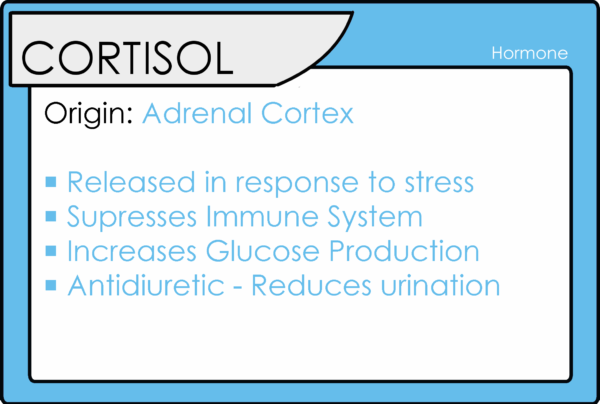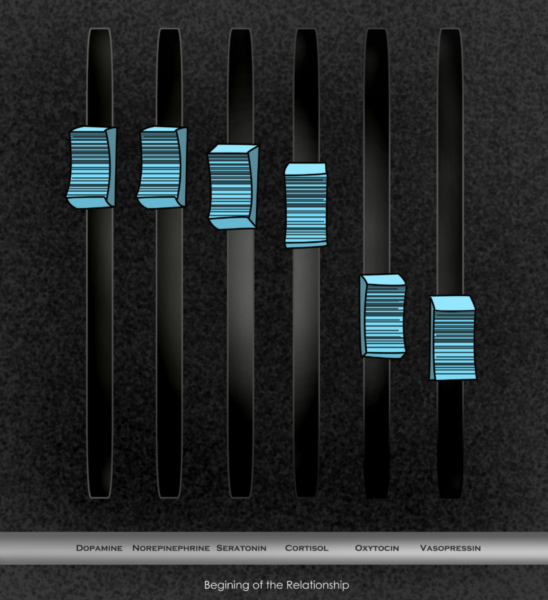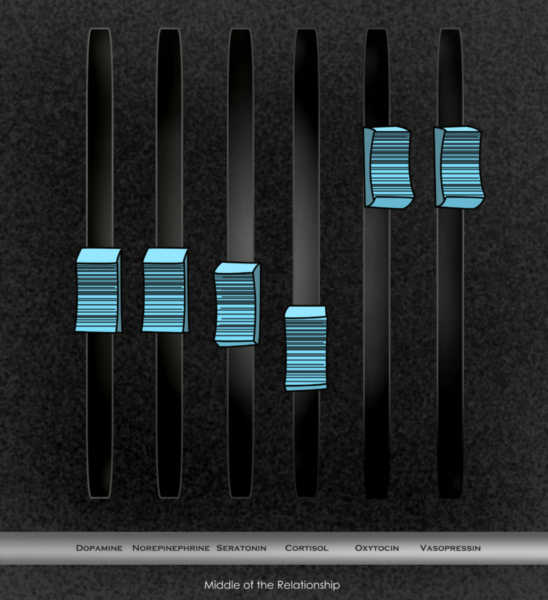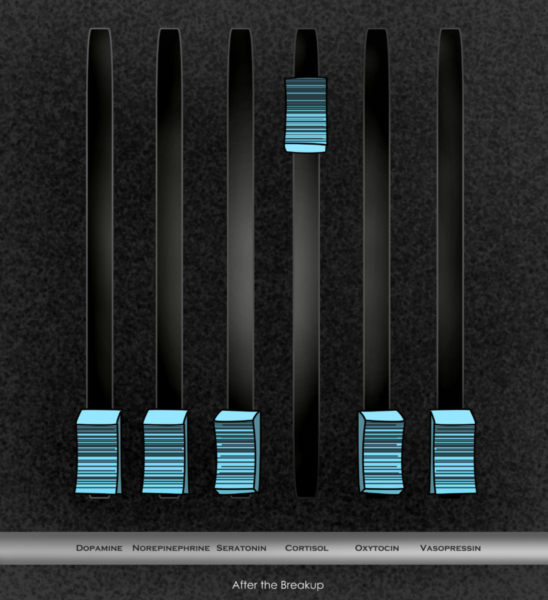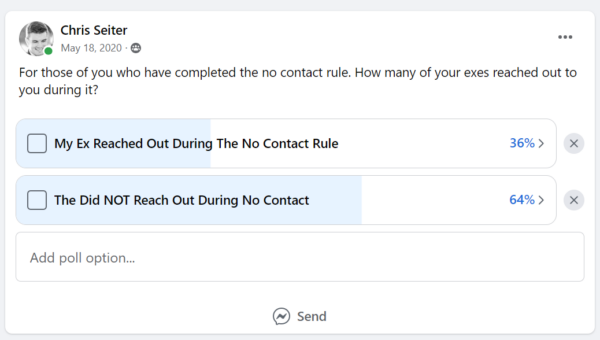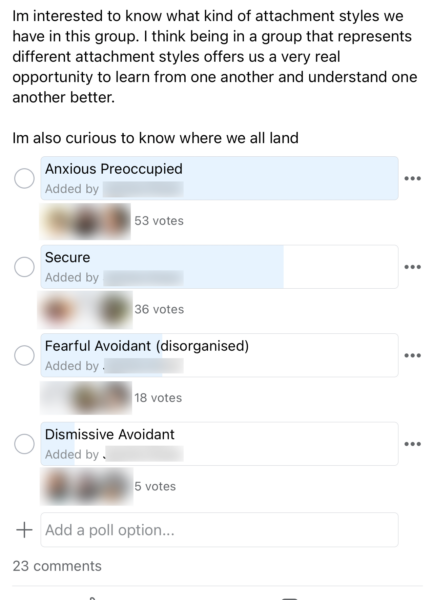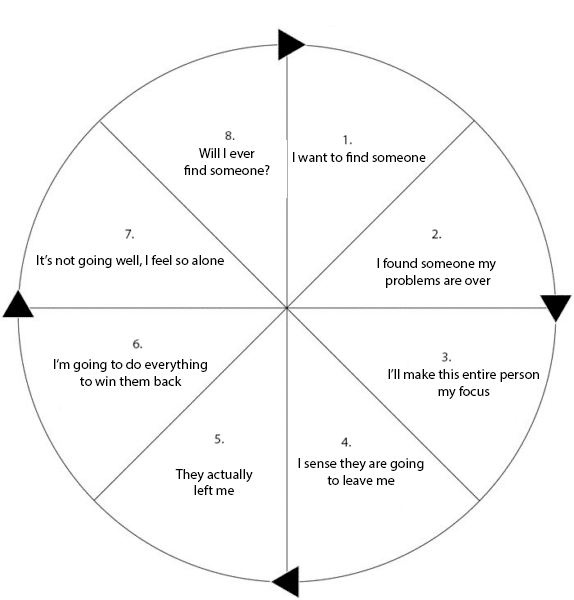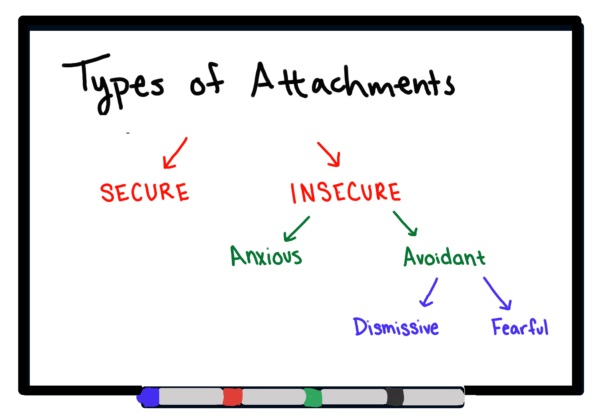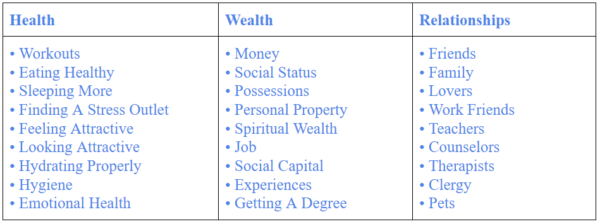Breakups are painful no matter if you are the dumper or the dumpee. What’s worse, is society often expects you to “get over” the breakup quickly. Yet, human beings are not lamps.
We can’t turn our feelings on and off on command and so we’re made to feel like we’re not normal if we can’t stop obsessing over our exes. Today, I’d like to talk about that a bit.
Specifically how to stop obsessing over your ex who hurt you. I believe it boils down to five steps,
- Understanding That Obsessing Over An Ex Is Normal: Cortisol is high, therefore stress is high, therefore obsession is more likely.
- Utilizing No Contact The Right Way: Embrace the idea that no contact isn’t meant to make your ex miss you but rather an opportunity for you to outgrow them.
- Adopt The Anxious To Secure Theory: Work on your anxiety so that you are a more confident and secure person
- Seek The Help Of A Community: Seeking social support is essential for maintaining physical and psychological health. Especially when it comes to breakups
- Find A Magnum Opus: It’s all about finding something that you care about just as much as your ex and investing your time into it.
Alright, from the top let’s go through this list and dissect it,

What Are Your Chances of Getting Your Ex Boyfriend Back?
Take the quizStep #1: Understand That Obsessing Over An Ex Is Normal
There’s a lot to discuss here, but to be concise, if you find yourself constantly stuck in a loop of obsessing over your ex, you’re not alone.
Many of the people I interact with daily through this website are fixated on their exes, and there’s a clear reason for this: cortisol.
To comprehend why cortisol is a major culprit, we need to understand what is happening neurochemically at each stage of a relationship.
At the beginning of a relationship, neurochemically, it looks like this.
Over time, it adjusts to this, which represents the middle period of the relationship where everything regresses to the mean.
Now, here’s what happens neurochemically when you go through a breakup: Cortisol levels shoot up.
Cortisol is significant because it’s also known as the stress hormone. The more stressed you become, the more likely you are to obsess over your ex. But the issue doesn’t stop there.
According to Dr. Jamie Lee, if your cortisol remains elevated and is consistently triggered, what should take maybe 3 or 4 hours for your cortisol to normalize again could take as long as 6 months. This interesting phenomenon occurs when you start to obsess over your ex; you keep your cortisol at this elevated state, and your body acclimatizes to it. So, what normally would take a few hours to level out can remain heightened for 6 months. But I would argue that if you’re unable to break free from this obsessive cycle of thinking about your ex and wondering if they’re seeing someone new, you could remain in this state for years. I can point to clients who have been trapped in this loop.
So, the two takeaways I want you to have from this step are: first, understand that you’re not alone—millions of other people are experiencing the same thing you are at this moment. Second, be aware of the danger of not addressing this issue.
There’s a risk in not putting in the work to move on, such as continuing to check your ex’s social media or obsessing over every little detail.
Step #2: Utilize No Contact The Right Way
Without a doubt, the no contact rule is the most popular strategy in the breakup industry.
The general idea is that you ignore your ex for a certain period of time, and then, after that period is over, you get back in touch with them, hoping that the absence has made the heart grow fonder and that your ex will miss you.
But I think that’s wrong. My research has consistently shown the opposite.
For example, a few years ago, I polled people and basically asked them, “For those of you who have completed the no contact rule, how many of your exes actually reached out to you during it?”

What Are Your Chances of Getting Your Ex Boyfriend Back?
Take the quizWell, 64% of the respondents said their ex never reached out at all. So, the idea that the no contact rule will make your ex more likely to reach out or miss you, I think, is false.
What’s even more interesting is when I interview success stories for my podcast, I always ask them, “What stood out to you during the no contact rule?” It’s usually not, “Yeah, my ex started blowing up my phone.”
It’s not that it’s impossible; it can happen but it’s not the norm.
Usually, what people say about the no contact rule is that they used that time to reconnect with themselves, to heal. I know that sounds cliché and like a cop-out, but I really buy into that idea. That’s why whenever I explain the no contact rule to someone, I emphasize that this is a break from your ex, and you are forcing yourself to begin healing from the breakup and to outgrow your ex.
This approach works consistently. Ever since we’ve had this mindset shift, many of our clients have adopted this mentality and seen results. We think they see results because most of the exes we’re dealing with, and trying to help clients get back or heal from, have avoidant tendencies, and an avoidant wants space.
That’s essentially their love language. They want space, and if you give them that space, you actually stand out from all the other people they’ve dated because no one gives space, especially during a breakup when closure isn’t necessarily had.
So, for my money, utilizing the no contact rule the right way isn’t about trying to get your ex back. It’s about trying to get yourself back. It’s about trying to outgrow your ex. So, if you want my advice on how to stop obsessing over your ex, step two is all about using no contact to outgrow that ex.
Adopt The Anxious To Secure Theory
Let’s talk a little about the anxious attachment style.
Based on internal polling, we know that our average client tends to have an anxious attachment style.
What does this mean?
The simplest way to understand the anxious attachment style is by recognizing what triggers it. Usually, a fear of abandonment triggers the anxious attachment style.
So, if you are in a relationship with someone who has an anxious attachment style, and they sense that you might leave them, they may panic and do everything they can to seek reassurance and fix the problem. When their fear comes true, as in a breakup, they often get caught in what I call the “anxious death loop.”
- They start off wanting someone to find them
- Believing they’ve found someone and their problems are over.
- Then they make this person their entire focus.
- They begin to sense that the person might leave them
- And when that person does leave, their anxiety takes over. It’s been taking over throughout the relationship with thoughts like “I’m going to make this entire person my focus,” and some of the codependent tendencies that occur.
- But when the client’s ex actually leaves, they decide to do everything in their power to win that person back.
- If it doesn’t go well, they feel alone, grow depressed, and wonder,
- “Will I ever find someone?”
This leads them right back to the beginning, which is why anxious people tend to be caught in the same loop, obsessing over their exes time and again. They’re trying to return to what they feel is their normal.
However, if most of our clients have anxious attachment styles, the thing to do is understand attachment theory. The goal of attachment theory, in my view, is to transform an insecure attachment style, like the anxious attachment style, into a more secure one.
That’s not easy. There are many things you can do, especially post-breakup, to start seeing positive results. First off, you need to start surrounding yourself with other secure individuals.
Spend More Time With Secure Individuals
Attachment styles are learned from your relationships. So, if you were in a relationship with a narcissist, you need to recognize that this person is not healthy for you and will only keep you anxious.
But I would also suggest auditing your friends and family members. Maybe not your mom, dad, brother, or sister—the ones you can’t really get rid of—but friends and other family members you’re around. If they’re making you more anxious, it’s important to take a break from them so that you can start replacing them with more secure individuals.
Build More Confidence And Self Eseteem
It’s also about building confidence and self-esteem. I’ve noticed that anxious individuals often lack self-esteem and confidence. They think they need to make their ex their entire world, partly due to a lack of self-esteem or confidence that they can’t find someone as good.
A secure person doesn’t view the situation like that. A secure person allows themselves to grieve after the breakup but has the internal confidence to know that everything will be okay.

What Are Your Chances of Getting Your Ex Boyfriend Back?
Take the quizFind Healthy Outlets For Obsessive Behavior
But perhaps the most important thing for someone with an anxious attachment style is to find healthy outlets for obsessive behavior. Imagine how much better your life would be if, instead of obsessively scrolling through Facebook to see what your ex is up to, you put the phone away, put on a podcast, and went out for a bike ride or a run.
Finding those healthy outlets for obsessive behavior can almost begin to retrain your brain. Instead of getting caught in a negative feedback loop, you’re creating a positive one for yourself.
Seek The Help Of A Community
Studies consistently show that social support is essential for maintaining physical and psychological health. And that’s just normal support. This is doubly true if you have just gone through a breakup.
What’s more, society doesn’t really offer a ton of support for breakups. The societal message is often to move on. We see this a lot with our clients; they try to clue their friends or family in, and their friends or family may be forthcoming at first. But as the obsession continues, they get annoyed and start saying, “You should already be over this by now.”
But as I stated at the very beginning of this discussion, human beings are not like lamps. We can’t turn our feelings on and off at will.
Probably the greatest thing that I feel I’ve been a part of creating is our community.
And this is not a pitch for it, but what I like about our community is that it helps people understand they’re not alone. They get to see other people obsess over their exes and help one another become more secure over time.
One of the reasons we created our “battle buddy” program is to partner you with someone who can hold you accountable and understand what you’re going through. You can see that every other week, we’re getting thank-you posts in our community like this one.
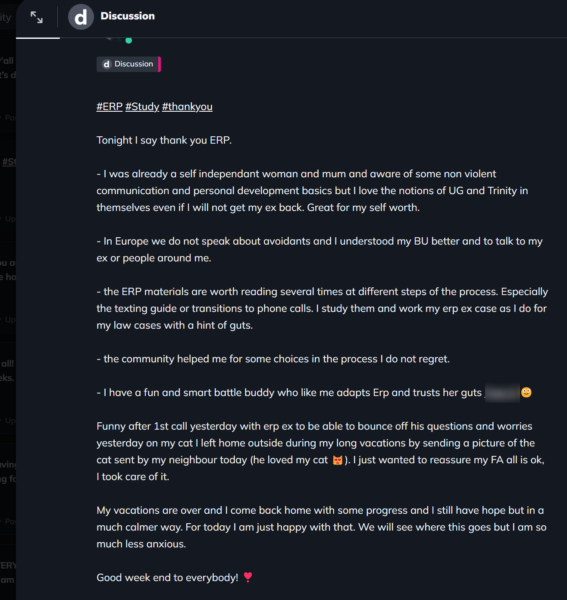
Tonight I say thank you ERP.
– I was already a self independant woman and mum and aware of some non violent communication and personal development basics but I love the notions of UG and Trinity in themselves even if I will not get my ex back. Great for my self worth.
– In Europe we do not speak about avoidants and I understood my BU better and to talk to my ex or people around me.
– the ERP materials are worth reading several times at different steps of the process. Especially the texting guide or transitions to phone calls. I study them and work my erp ex case as I do for my law cases with a hint of guts.
– the community helped me for some choices in the process I do not regret.
– I have a fun and smart battle buddy who like me adapts Erp and trusts her guts [Redacted for privacy]
Funny after 1st call yesterday with erp ex to be able to bounce off his questions and worries yesterday on my cat I left home outside during my long vacations by sending a picture of the cat sent by my neighbour today (he loved my cat ). I just wanted to reassure my FA all is ok, I took care of it.
My vacations are over and I come back home with some progress and I still have hope but in a much calmer way. For today I am just happy with that. We will see where this goes but I am so much less anxious.
Good week end to everybody! ❣️
The main point is, if you read through this person’s expression of thankfulness or their desire to pay it forward, you’ll see there’s a lot that the community has taught them:
- Being more independent
- Having a better understanding of how avoidants work
- Understanding the breakup better
- Getting access to ex-recovery program materials
- Understanding the texting guide
- Transitioning to phone calls, and how the community can help prevent you from making poor choices.
- Having a battle buddy and surrounding yourself with individuals in the same boat as you is a healthy outlet, as opposed to going to friends or family and burdening them with problems they may not be equipped to deal with or are unaccustomed to handling.
- You can come into a safe space and share. It’s almost a form of therapy, group therapy.
Finding A Magnum Opus
I firmly believe that most of our clients tend to have anxious attachment styles.
Polling supports this,

What Are Your Chances of Getting Your Ex Boyfriend Back?
Take the quizBut I would also argue that many of our clients tend to be very codependent.
What does codependence mean?
Officially, it’s the excessive emotional or psychological reliance on a partner, typically one who requires support due to an illness or addiction.
Obsession over your ex can be a form of addiction.
I’ve often discussed the pillar theory or the pedestal theory, which suggests we’re always trying to find someone either equal to us on the pedestal or above us. Usually, those who obsess over their exes and are completely desperate and anxious are seen by their ex as being below them on the pedestal.
My job is to help our clients knock their ex off this pedestal, so they feel they can reclaim their life. This is an analogy for discussing codependency. If your entire world revolves around one person, then you are not living as a full person.
You become like a symbiotic slug or a leech—I’m not sure what the perfect analogy is, but I think you get the idea. This is why I always tell our clients they need to find a magnum opus, something they care about as much as they cared about their ex, something to focus on that allows them to reclaim their life and be the center of their own world.
Now, how do you find your magnum opus?
During the no contact rule, I advise my clients to adopt what I call the holy trinity, which involves looking at your life and dividing it into three distinct areas: health, wealth, and relationships.
The goal with the holy trinity is to find a balance every day—doing something to improve your health, your wealth, and your relationships (outside of your ex) each day. It’s easier said than done. We work maybe eight, sometimes ten hours a day, which is wealth-related, but that doesn’t leave much energy for health or relationships. So it’s about finding that balance.
The way you find your magnum opus is by finding one thing that helps with all three categories of the holy trinity. It should help you become healthy—and health isn’t just about physical exercise like running or lifting weights; mental health is equally important. It should be something that can also generate income (wealth) and something that allows you to build new relationships.
If you can find one thing that satisfies all these conditions, that’s a worthy magnum opus goal.
And usually, a magnum opus goal isn’t something you can complete within a week; it’s something that takes decades, or even a lifetime, to achieve. The best way I’ve found to break out of codependent tendencies is to adopt a magnum opus.
